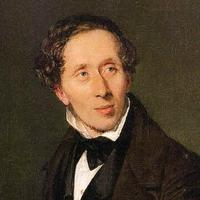The shoes of fortune, III. The Watchman's Adventure, part 3
As to ourselves, we all know the speed produced by the employment of steam; we have experienced it either on railroads, or in boats when crossing the sea; but such a flight is like the travelling of a sloth in comparison with the velocity with which light moves. It flies nineteen million times faster than the best race-horse; and yet electricity is quicker still. Death is an electric shock which our heart receives; the freed soul soars upwards on the wings of electricity. The sun's light wants eight minutes and some seconds to perform a journey of more than twenty million of our Danish [*] miles; borne by electricity, the soul wants even some minutes less to accomplish the same flight. To it the space between the heavenly bodies is not greater than the distance between the homes of our friends in town is for us, even if they live a short way from each other; such an electric shock in the heart, however, costs us the use of the body here below; unless, like the watchman of East Street, we happen to have on the Shoes of Fortune.
* A Danish mile is nearly 4 3/4 English.
In a few seconds the watchman had done the fifty-two thousand of our miles up to the moon, which, as everyone knows, was formed out of matter much lighter than our earth; and is, so we should say, as soft as newly-fallen snow. He found himself on one of the many circumjacent mountain-ridges with which we are acquainted by means of Dr. Madler's "Map of the Moon." Within, down it sunk perpendicularly into a caldron, about a Danish mile in depth; while below lay a town, whose appearance we can, in some measure, realize to ourselves by beating the white of an egg in a glass of water. The matter of which it was built was just as soft, and formed similar towers, and domes, and pillars, transparent and rocking in the thin air; while above his head our earth was rolling like a large fiery ball.
He perceived immediately a quantity of beings who were certainly what we call "men"; yet they looked different to us. A far more correct imagination than that of the pseudo-Herschel* had created them; and if they had been placed in rank and file, and copied by some skilful painter's hand, one would, without doubt, have exclaimed involuntarily, "What a beautiful arabesque!" *This relates to a book published some years ago in Germany, and said to be by Herschel, which contained a description of the moon and its inhabitants, written with such a semblance of truth that many were deceived by the imposture.
Probably a translation of the celebrated Moon hoax, written by Richard A. Locke, and originally published in New York.
They had a language too; but surely nobody can expect that the soul of the watchman should understand it. Be that as it may, it did comprehend it; for in our souls there germinate far greater powers than we poor mortals, despite all our cleverness, have any notion of. Does she not show us--she the queen in the land of enchantment--her astounding dramatic talent in all our dreams?

